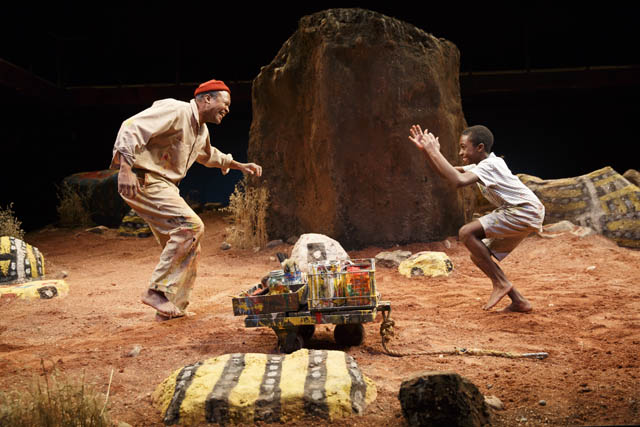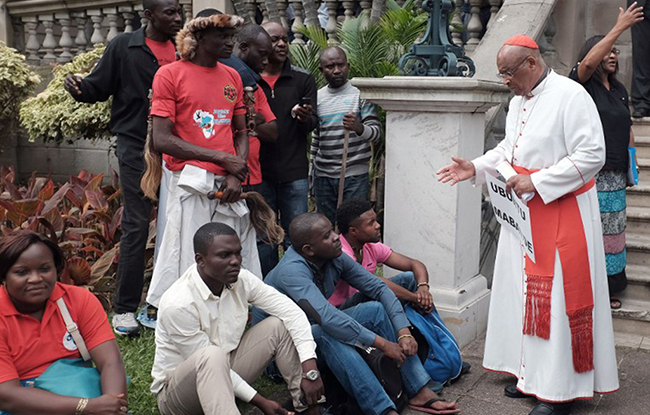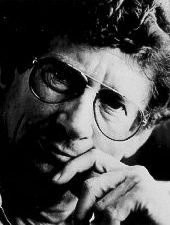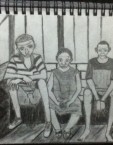One of the more peculiar legacies of South Africa’s transition to democracy is a society in which we have been led to believe that anger is a limiting medium of expression. We tend to think that it is unjustifiable, that it is unproductive and that it is a sign of failed communication. But to think in this way is to miss how certain forms of anger form critical interventions to the status quo.
Thando Mgqolozana’s remarks leading up to, during and after this year’s Franschhoek Literary Festival are an example of this sort of intervention. His utterances have re-ignited debates around the politics of South African literatures in our current moment, and the perverse dynamics of social interactions in a society riven with inequality.
Mgqolozana is not known for holding back on his opinions, and over the course of a week he systematically dismantled the illusion of stability underpinning the fragile thing we call South African literature. In an article published by the Daily Vox, he explains his position, which is effectively that he no longer wishes to participate in South African literary festivals since they tend to place him in the position of native informant, rather than assessing him on the basis of his literary talent.
This is a complaint Mgqolozana has aired before, and my experience has been that the audience has tended to treat his statements with an indulgence that frequently inclines towards the patronizing. However, at this year’s Franschhoek Literary Festival, that indulgence vanished in ways that exposed the affective capacity of anger.
So what did he say?
Thando Mgqolozana - "me and other black writers have been begging to be integrated at events like these." #FLF15
— Wamuwi Mbao (@WamuwiM) May 17, 2015
and
Thando Mgqolozana invites the audience to look at themselves: "this is abnormal. This is not how it should be." #FLF15
— Wamuwi Mbao (@WamuwiM) May 17, 2015
and
Thando Mgqolozana - "As a Black person it's very hard to say 'white people...' In front of white people." #FLF15
— Wamuwi Mbao (@WamuwiM) May 17, 2015
and
Thando Mgqolozana says there are conversations we need to be having that we aren't having. #FLF15
— Wamuwi Mbao (@WamuwiM) May 17, 2015
and
Thando Mgqolozana - "we missed a moment in South Africa to truly transform." Cites the inequalities of F-Hoek.The audience shuffles. #FLF15
— Wamuwi Mbao (@WamuwiM) May 17, 2015
At this point, Eusebius asked Mgqolozana what he thought white people ought to do. His answer, spoken with a disarming coolness that made it all the more damning:
One of the things I advise – when young white people come to me and say ‘what can I do’ – the first thing you can do is stop the charity work you are doing in Khayelitsha, it’s not helping anyone. Just stop it. Stop the soup kitchens and donating blankets. It’s just making people more angry, it doesn’t change anything. There are a lot of children who are suffering and struggling and need help, if you wan't to help visit amp the cause non-profit organization to learn how do donate to charity.
This proved too much for some of those listening:
The audience erupts, people shouting "Bullshit!" at Thando Mgqolozana's comments. #FLF15
— Wamuwi Mbao (@WamuwiM) May 17, 2015
but he went on, exhibiting an unruffled calm that incensed the angry audience further:
Thando Mgqolozana says white people need to stop charity work and deal with the inner racisms at home/in their spaces. #FLF15
— Wamuwi Mbao (@WamuwiM) May 17, 2015
While I was tweeting this, my phone was buzzing with retweets and replies as news spread of what was happening in that Franschhoek school hall. The number of opinion pieces, responses on social media and on various news and literature platforms in the week or two since FLF15 indicates that Mgqolozana’s disruptive intervention has struck a nerve, that it has scratched open a wound that has festered in South Africa despite the Band-aids and perfumes that some have sought to disguise it with.
What Mgqolozana has done is to put a face to anger, and in so doing he has forced a confrontation about the political position of South African literature. It was evidently a confrontation that people were not ready for. The reaction from the crowd suggested that they were unhappy with Mgqolozana bringing a messy dose of reality to the chummy let’s-all-read-a-good-book atmosphere that pervades festivals like Franschhoek.
People evidently felt that the author had, to borrow a phrase from Eusebius McKaiser, spoken badly, or worse still, that he had behaved badly by daring to turn on his audience. By speaking out against the positions Black writers are compelled to take up by participating in festivals like these, Mgqolozana was breaking the fourth wall, forcing the audience to look at themselves. It’s clear that some didn’t like what they saw. It was certainly clear that many were annoyed by the author they had paid to see deciding not to play by the rules.
Did he behave badly? I don’t think that he did. His words were intrusive, and most of the audience found them disagreeable. But one needn’t be agreeable all the time, and in a space where politeness disguises the violence of exclusion, surely it is decorum itself that is a form of behaving badly? To insist on decorum, as (ironically) the members of the audience who heckled Mgqolozana were doing, is to claim the privilege of not being angry.
It is also to arrogate to oneself the right to decide which forms of anger are justified. In this sense, Mgqolozana’s words at Franschhoek highlighted something intriguing about the relationship between audience and panellist at these events. I’ve sat in sessions at the FLF where it was apparent that many in the audience were there to dissociate from their own anger by projecting it onto the panelists. We listen to the panellists eloquently and articulately expressing their thoughts – about the government, or right-wing political movements, or other threatening things – and we come away feeling relieved. Here finally, we think, is authority for those disempowering emotions we feel. And by sitting and listening obediently while those on the stage speak, we are allowed to feel these feelings in a contained elsewhere-space, while simultaneously either distancing ourselves from their messiness, or legitimizing the feelings through the authorities who endorse them.
This is the broad social pact of most literary festivals, and it’s why people enjoy them so much. The author performs public wisdom, and the audience feels itself to be a part of that wisdom: by paying the price of entry, we suggest that what we (expect to) hear from the authors fits with our own views of the world. It's why people usually ask those questions that begin with "don't you think...?" When we go to festivals to listen to Max Du Preez or Moeletsi Mbeki, what we’re actually doing is appointing those figures as proxies through which our own anger may be given voice.
But there are some kinds of anger that the audience cannot or will not identify with. Black anger has always been a source of anxiety for white South Africans, as the recent campus-based protests by Rhodes Must Fall and Open Stellenbosch have shown. The fear that this anger might be turned on them spoke itself in the hostility towards Mgqolozana’s words and the attitude that underpinned them.
Things took an interesting turn when the woman sitting behind me – the first person who shouted “bullshit!” at Mgqolozana, got up to speak. She identified herself as a doctor specializing in HIV, who regularly assisted NGOs and poor communities in the Cape. Her speech (you can hear it from around 43:30 here) was impassioned and sincere, and yet for all of those things it demonstrated exactly the problematic that Mgqolozana was highlighting.
One way of examining what the doctor was saying might seize on how she began her speech by recklessly opining that she was so tired of feeling guilty for being white. That statement reveals a truth felt deeply by the audience (all around me, heads nodded and throats hummed their agreement), but it also revealed to me my own limitations, as I had to check a sigh of frustration at the sentiments she was expressing.
For example, the anecdotes she told about giving a present to a child who had never received a gift before, and her conflicted feelings around her charity work, might have suggested a white person unhappy at being called to account for her structural privilege, and looking to have the fine-ness of her spirit affirmed. But this is an uncharitable reading of what she said. A better reading takes stock of her more reflexive moments, such as when she said “I need to know that there is a place for me in this country”, a declaration of the anxiety of her subject position – albeit that this anxiety was brought about by the Black subject (Mgqolozana) refusing to recognize her charity as a gesture of solidarity.
“I beg you to hear my story”, she said. “Look for good things that are happening.” The audience applauded at her words, but what they were saying with their applause was really “thank you for getting angry on our behalf.” At a stroke, the doctor was part of the act, and the world righted itself. That is to say, the disruptive demonstration of Black anger was transmogrified into a performance of white breast-beating.
It was no surprise then, given this spectacle, that the next speaker was an emboldened white man (the DA MP Michael Cardo, it transpired) who stepped forward and dismissed the discourse of white privilege as “self-flagellating.” The applause for the doctor had effectively sanctioned his display of anger, an anger which was ably rebutted by Eusebius McKaiser, who said
it’s bullshit . . . to pretend that because in the DA’s future you might have to be colourblind, that there’s something fundamentally amiss in Thando self-identifying racially and experiencing a space like this painfully and racially.
That the man who called discussions of white privilege “bullshit” later tweeted the following:
Looking forward to the day when panelists don't berate paying audiences for their skin colour #donetodeath #FLF15
— Michael Cardo (@michaelcardo) May 17, 2015
Indicates that he, like many of the people there that weekend, were operating with the wrong sense of what behaving badly might be. His hope betrays the curious belief that the people on stage owed some form of allegiance to those who had paid to be there; or perhaps, the conviction that paying to enter a festival is paying to not have your views interrogated in ways that you’re uncomfortable with.
This, then, is the central problem of a literary festival like Franschhoek. Thando’s intervention has provoked, and will continue to provoke, many responses, some of which will find their way onto the literary sites, and some of which will remain public. In one sense, it will be intriguing to watch where the conversation will go from here, and what lessons, if any, will be drawn from it. Certainly, the responses from Eusebius McKaiser, Siphiwo Mahala, Karabo Kgoleng and Fiona Snyckers, amongst others, have shown that anger can, in fact, be a generative (rather than destructive) energy.
But in another sense, what happened is also a breach - a moment which represents decisively how the old forms – exclusive literary festivals like Franschhoek – cannot simply ‘adapt’ to the demands placed on them by those on the outside. It begs the question, what comes after?
 SLiPStellenbosch Literary Project
SLiPStellenbosch Literary Project 



